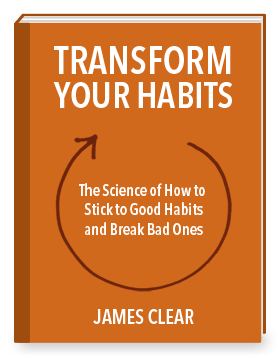“What most people don’t realize is that your habits don’t follow your ambition, they follow your system.”
CONVERSATION WITH
Multifaceted Motivator Book: Transform Your Habits | Book: The ONE Thing: The Surprisingly Simple Truth Behind Extraordinary Results |
READ ON TO DISCOVER:
- Victor Hugo’s dramatic trick to stop procrastinating
- The daily habit that made Jerry Seinfeld such a success
- The single behavior that often separates top performers from the pack
James Clear is a productivity expert who uses behavioral science to help nearly half a million newsletter subscribers optimize their habits. He recently sat down with bestselling author Jay Papasan to discuss the hidden psychology of our habits, and how we can build habits to achieve success in the office, at the gym, and everywhere in between.
This conversation has been edited and condensed. To view Jay and James’s full conversation, click the video below.
Habits, Not Goals, Will Bring You Success (feat. Jay Papasan & James Clear) from heleo on Vimeo.
Jay: What’s the basic structure for how habits get formed?
James: I think about it as a four-stage model: noticing, wanting, doing, and liking. As an easy example, if you have a coffee cup sitting on the table, you have to first notice that it is there before you can do anything about it. All habits are like this. They have to come into our awareness for us to act on them.
Then there’s wanting, which is desire. Now, if you see a coffee cup on the table but you don’t actually want to drink coffee, then you won’t do anything. A trigger only gets you to act if it causes you to approach, causes you to do something, and that happens because there is desire. When wanting happens, there is a spike of dopamine in the brain before the action. That spike happens, that gets you desiring it, it drives you to take action, and that brings us to the third stage, which is doing.
The doing is the actual habit itself, and then after you do the action, there is usually some kind of reward, and it gets you to like or repeat [the action]. So you see the coffee cup on the table, you want to drink coffee so you pick it up and drink it.
If you like it, if you get a reward from it, then you want to repeat that action. Those four stages eventually become automatic because we’ve repeated them so much, and at that point, once the behavior has come nonconsciously formed, we’ll say it is a habit.
“The greatest benefit that goals provide is direction, and once you have a clear direction, pretty much all your energy should be focused on the system and the process.”
Jay: I’ve got young kids, so one of the habits we’ve been trying to help them build is brushing their teeth. Where would the wanting [come] in on some of these habits that we know we need to do, but we don’t really like to do?
James: In many cases, people assume that what they lack is motivation, when what they really lack is clarity.2 Most people want to have clean teeth, or want to be in shape, or want to be calm and not stressed, or want to succeed in the workplace. It’s not that the desire is not there. The problem is that when the moment comes to act, they either don’t notice that the moment is there and so it passes them by, or they don’t have the systems in place to make it easy for them to act at that time.
I got my teeth-brushing habit from my parents, like many of us did, and I did that every morning and night without fail. But for a long time I didn’t floss consistently, so I started to look at that habit. The first thing that I realized was I wasn’t noticing. I would just automatically brush my teeth without realizing, “Oh, this is also the time to floss.” One problem sounds so basic, but the floss was hidden in a drawer in the bathroom, rather than being visible. So I went and bought a little bowl for $2 at Target and set it right next to the toothbrush and filled it with those pre-made flossers.
This is trying to reduce the friction associated with doing it. I didn’t like to have to wrap the floss around my fingers, so I would just pick it up and do it right away. This is the most micro example ever, but you can take that idea and apply it to many different habits. How can you make them more visual so that you notice them, so that they’re obvious in your environment? How can you reduce the friction or the pain point of the habit so that even if your desire isn’t that high, it’s still enough to get you to act?
Another common example is fitness. For a long time, my mom wanted to be in shape, but she didn’t like working out in public, so the idea of going to a YMCA or a gym wasn’t appealing to her. Once she figured out that that was the friction point, she bought a home yoga DVD, and she started doing that four days a week. Reducing the friction of an action so that it’s low enough to match the actual desire you have is one great way to get through that hurdle of wanting or desire.
Jay: Sometimes wanting doesn’t have to be, “I want to go to Alaska on vacation.” It can also be, “Oh, I know I need to do that.”
James: Right. Here’s another example. For a long time, I would buy apples and put them in the crisper in the bottom of my fridge, and they would sit there for three weeks and go bad. I was like, “I want to eat fruit. I want to be healthy, and I’m just wasting money.” [So] I bought a larger bowl and set that on the counter. When we buy apples now, we put them there. Now I eat one every day. I don’t even think about it. I changed nothing else, I just made it more obvious.
There are many things that we have a general desire to do, but we don’t make it obvious or easy for ourselves to do it, and we end up wanting to do something [else] in the moment: watch Netflix, eat junk food, whatever. Desire comes in waves and spikes. It will not always be there, so if you can capitalize when the spike is high, you can change your action down the line.
One of my favorite examples of that is Victor Hugo. When he was writing The Hunchback of Notre Dame, he was procrastinating for over a year. He just hosted parties and didn’t send anything to his publisher, and eventually the publisher got tired of it. They said, “You have six months to write this book, or it’s getting canceled.” So he had his assistant gather up all of the clothes in his closet and take them out of the house. The only thing left was this giant shawl, so he had no clothes to see people in or to go out in public in. He basically put himself on house arrest.
And it worked. He got the manuscript done two weeks ahead of time. He locked in those future actions. He was like, “I know I’m not going to want to do this two months from now, but I don’t have any clothes to leave the house, so I guess I’ve got to stay here and write.”

Jay: That makes me think of Ulysses tying himself to the mast.
You’ve written about this idea of using systems versus goals. You’ll have to refresh my memory.
James: The basic idea is that we often focus on the milestone or the achievement, but in fact, the way that we ever get anywhere is through some kind of repeated action or system.2 If you’re a basketball coach, your goal might be to win the championship, but your system is how you run practice each day. If you’re a writer, your goal might be to write a bestselling book, but your system is the writing process that you follow each day. If you’re a runner, your goal might be to finish a marathon, but your system is how often you run each week.
The question that came to my mind was, what if you just completely forgot about the goal [and] just focus on the system? What if you’re a basketball coach and you don’t even think about winning the championship, but you just focus on running the very best practice you can each day? Would you still get results? I think you would.
The greatest benefit that goals provide is direction, and once you have a clear direction, pretty much all your energy should be focused on the system and the process.1
Jay: “Habit” is, in my mind, another word for a “system.”
James: I like to think about it as the system supports the habits that will help you achieve the goal. Let’s say that you have a habit of flossing your teeth. The system could be buying the pre-made flossers and setting them on the counter.
What most people don’t realize is that your habits don’t follow your ambition, they follow your system. People think that you achieve something based on how ambitious you are, or how much you want it. But in the long run, the system ends up winning over those things.
I’ve never seen someone, for example, stick to a positive habit in a negative environment. If you’re fighting your system every day, eventually the system washes you away. So figuring out how to optimize that system is the key to building habits that last.
Jay: Championship dynasties are built on systems. You can have a one-year [success] because some kid became an unexpected MVP, but the dynasties are built on systems. I look at Belichick and the Patriots, I look at Saban in Alabama. There are a lot of ways to be average, but if you want to be extraordinary, the system is the surest way to get there.
James: Yeah. What’s interesting is that a lot of habits enter our lives through a back door. Everything that surrounds us is a system to some degree. The religious ideas you were exposed to, the educational ideas you were exposed to, the friends that you hang out with, they’re all pieces of the system that influences your habits. And if you look at the person you are today, it’s largely a result of the systems that you were exposed to. Our behaviors get automated without us really thinking about it.
[But] once you realize that, it becomes your responsibility to shake the system. The thing that was previously not under your control can become under your control, and it becomes your choice as to how to design the future, and what influences you want to have [in] your life.
Jay: What advice do you give to people for how to form a habit so that it doesn’t have to be hard every time?
James: There’s a story about Jerry Seinfeld I love using as an example. Seinfeld, one of the most popular comedians of his generation, was once asked by a young comedian if he had any tips for a young comic.
Seinfeld said, “The secret to being a better comic is to write better jokes, and the secret to writing better jokes is to write every day. So one thing that you could do is get this big calendar and put it on your wall, and you can see every day of the year mapped out on it. Each day that you do your task of writing jokes for 10 or 15 minutes or whatever, I want you to take a sharpie and put an X on that day. At some point, you’re going to get a bit of a chain going: five, six, seven, eight days in a row. And at this point, your only goal becomes to not break the chain. It’s not about how good or how bad the jokes are, it’s not about how you feel about them, it doesn’t matter if it makes it into your material or not. Just don’t break the chain.”
I have had friends use that same philosophy for workout habits. I have friends who use it as video editors. Every day, they do their 30 minutes of video editing, they put an X on that day. You can do it for pretty much any repeated task, but what is so useful is that it helps you get those reps in, which are so essential for building a habit. It’s a natural motivator, too. You see that chain and you’re like, “Oh, I’ve got 12 days, I don’t want to break it.”

It helps you notice because it’s a visual cue, it helps you want it because you see the chain building, and it also helps you like it because as soon as you’re done, you get to put another X down. So it hits on all levels of that noticing, wanting, doing, and liking.
One thing I want to add to that Seinfeld strategy is that top performers are not perfect. They make mistakes just like everybody else. But what separates them is that they get back on track more quickly than other people. If they miss a workout, they’re back in there the very next day. Of course you want to keep your chain going for as long as you can, but at some point, your kid’s going to get sick, or you’re going to get sick, or you’re going to go on vacation, and you’re going to slip. In that case, the idea that I like to keep in mind is “Never miss twice.” As soon as you miss once, put all of your energy into getting back in the very next time, and make sure that you don’t miss twice in a row.
It’s not about whether you did it today or not. You don’t have to beat yourself up about it. It’s always about the long-term performance. If you commit to it consistently, the body of work will be there.
|
|





No comments:
Post a Comment